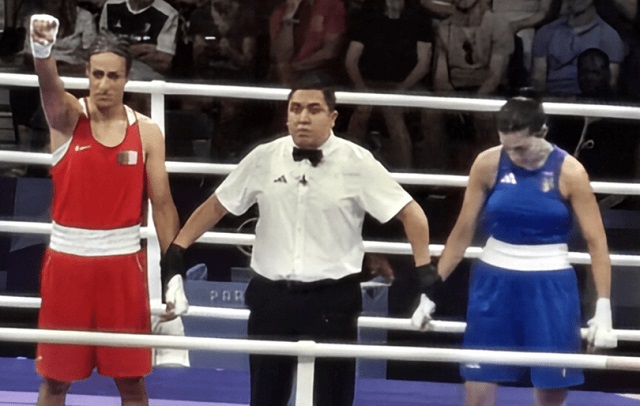Opinion
Olympic women’s boxing match lasts 46 seconds after male competitor lands heavy blow

From LifeSiteNews
In a disgraceful display at the 2024 Paris Olympics, an Algerian man named Imane Khelif, who calls himself a woman, defeated Italian woman Angela Carini in a boxing match in the women’s 66-kilogram weight class after Carini abandoned the fight in just 46 seconds following a substantial blow to the head.
Video footage of the Thursday match shows Khelif, a 25-year-old man, striking Carini, a 25-year-old woman, hard in the jaw to start the lopsided fight.
NOW – Angela Carini (blue) abandons her fight against Imane Khelif, who failed a gender test, at the Olympics. The "fight" lasted less than a minute.pic.twitter.com/MFyow0yokz
— Disclose.tv (@disclosetv) August 1, 2024
Following the heavy blow, Carini landed a counter-strike on the male Khelif, at which point he appeared to complain to the referee, motioning to the back of his head. The fight concluded after just 46 seconds, with Carini abandoning the match and appearing to refuse to shake the man’s hand after he was absurdly declared the victor.
Following the match, a previous interview with Carini began to be shared online. In the pre-Olympics interview, Carini, through tears, talked about her dedication to training and the role her late father played in helping her persevere in competition.
https://x.com/i/status/1819002043836571776
Despite Khelif being male, the Olympics Committee ignored biological reality and approved him, along with a Taiwanese man, to be allowed to compete in the women’s boxing division based on his false assertion that he is female. In fact, Khelif was one of a number of men who had been previously disqualified from female competition by the International Boxing Association (IBA), after president Umar Kremley announced Khelif and others had failed “a series of DNA-tests” and “were trying to fool their colleagues and pretend to be women.”
The match between Khelif and Carini quickly drew backlash online.
Former British Olympian and medalist Sharon Davies skewered the International Olympic Committee (IOC) for allowing a man to compete against a woman, also saying she is “astonished” at the “weakness of the media.”
This is a biological male fighting a female & absolutely everyone can see it, they have also failed gender screening, twice & have XY chromosomes. There is no ambiguity that the IOC do not care if a female gets seriously hurt. Or worse. I’m astonished at the weakness of the media pic.twitter.com/gXG1FCZDq5
— Sharron Davies MBE (@sharrond62) August 1, 2024
“Inclusion. Brought to you by the International Olympic Committee,” sarcastically quipped American female athlete Riley Gaines, who is known for her opposition to men in female sports.
Inclusion
Brought to you by the International Olympic Committee pic.twitter.com/HszyyDVEaZ
— Riley Gaines (@Riley_Gaines_) August 1, 2024
Business
Rhetoric—not evidence—continues to dominate climate debate and policy

From the Fraser Institute
Myths, fallacies and ideological rhetoric continue to dominate the climate policy discussion, leading to costly and ineffective government policies,
according to a new study published today by the Fraser Institute, an independent, nonpartisan Canadian public policy think-tank.
“When considering climate policies, it’s important to understand what the science and analysis actually show instead of what the climate alarmists believe to be true,” said Kenneth P. Green, Fraser Institute senior fellow and author of Four Climate Fallacies.
The study dispels several myths about climate change and popular—but ineffective—emission reduction policies, specifically:
• Capitalism causes climate change: In fact, according to several environment/climate indices and the Fraser Institute’s annual Economic Freedom of the World Index, the more economically free a country is, the more effective it is at protecting its environment and combatting climate change.
• Even small-emitting countries can do their part to fight climate change: Even if Canada reduced its greenhouse gas emissions to zero, there would be
little to no measurable impact in global emissions, and it distracts people from the main drivers of emissions, which are China, India and the developing
world.
• Vehicle electrification will reduce climate risk and clean the air: Research has shown that while EVs can reduce GHG emissions when powered with
low-GHG energy, they often are not, and further, have offsetting environmental harms, reducing net environmental/climate benefits.
• Carbon capture and storage is a viable strategy to combat climate change: While effective at a small scale, the benefits of carbon capture and
storage to reduce global greenhouse gas emissions on a massive scale are limited and questionable.
“Citizens and their governments around the world need to be guided by scientific evidence when it comes to what climate policies make the most sense,” Green said.
“Unfortunately, the climate policy debate is too often dominated by myths, fallacies and false claims by activists and alarmists, with costly and ineffective results.”

Kenneth P. Green
Senior Fellow, Fraser Institute
Business
Canada’s economic pain could be a blessing in disguise

This article supplied by Troy Media.
 By Roslyn Kunin
By Roslyn Kunin
Tariffs, inflation, and falling incomes sound bad, but what if they’re forcing us to finally fix what’s broken?
Canada is facing serious economic headwinds—from falling incomes to rising inflation and U.S. trade hostility—but within this turmoil lies an opportunity. If we respond wisely, this crisis could become a turning point, forcing long-overdue reforms and helping us build a stronger, more independent economy.
Rather than reacting out of frustration, we can use these challenges to reassess what’s holding us back and move forward with practical solutions. From
trade policy to labour shortages and energy development, there are encouraging shifts already underway if we stay focused.
A key principle when under pressure is not to make things worse for ourselves. U.S. tariffs on Canadian steel and aluminum, and the chaotic renegotiation of NAFTA/CUSMA, certainly hurt our trade-dependent economy. But retaliatory tariffs don’t work in our favour. Canadian imports make
up a tiny fraction of the U.S. economy, so countermeasures barely register there, while Canadian consumers end up paying more. The federal government’s own countertariffs on items like orange juice and whisky raised costs here without changing American policy.
Fortunately, more Canadians are starting to realize this. Some provinces have reversed bans on U.S. goods. Saskatchewan, for example, recently lifted
restrictions on American alcohol. These decisions reflect a growing recognition that retaliating out of pride often means punishing ourselves.
More constructively, Canada is finally doing what should have happened long ago: diversifying trade. We’ve put too many economic eggs in one
basket, relying on an unpredictable U.S. market. Now, governments and businesses are looking for buyers elsewhere, an essential step toward greater stability.
At the same time, we’re starting to confront domestic barriers that have held us back. For years, it’s been easier for Canadian businesses to trade with the U.S. than to ship goods across provincial borders. These outdated restrictions—whether on wine, trucks or energy—have fractured our internal market. Now, federal and provincial governments are finally taking steps to create a unified national economy.
Labour shortages are another constraint limiting growth. Many Canadian businesses can’t find the skilled workers they need. But here, too, global shifts
are opening doors. The U.S.’s harsh immigration and research policies are pushing talent elsewhere, and Canada is emerging as the preferred alternative.
Scientists, engineers and graduate students, especially in tech and clean energy, are increasingly choosing Canada over the U.S. due to visa uncertainty and political instability. Our universities are already benefiting. If we continue to welcome international students and skilled professionals, we’ll gain a long-term advantage.
Just as global talent is rethinking where to invest their future, Canada has a chance to reassert leadership in one of its foundational industries: energy.
The federal government is now adopting a more balanced climate policy, shifting away from blanket opposition to carbon-based energy and focusing instead on practical innovation. Technologies such as carbon capture and storage are reducing emissions and helping clean up so-called dirty oil. These cleaner energy products are in demand globally.
To seize that opportunity, we need infrastructure: pipelines, refining capacity and delivery systems to get Canadian energy to world markets and across our own country. Projects like the Trans Mountain pipeline expansion, along with east-west grid connections and expanded refining, are critical to reducing dependence on U.S. imports and unlocking Canada’s full potential.
Perhaps the most crucial silver lining of all is a renewed awareness of the value of this country. As we approach July 1, more Canadians are recognizing how fortunate we are. Watching the fragility of democracy in the U.S., and confronting the uncomfortable idea of being reduced to a 51st state, has reminded us that Canada matters. Not just to us, but to the world.
Dr. Roslyn Kunin is a respected Canadian economist known for her extensive work in economic forecasting, public policy, and labour market analysis. She has held various prominent roles, including serving as the regional director for the federal government’s Department of Employment and Immigration in British Columbia and Yukon and as an adjunct professor at the University of British Columbia. Dr. Kunin is also recognized for her contributions to economic development, particularly in Western Canada.
Troy Media empowers Canadian community news outlets by providing independent, insightful analysis and commentary. Our mission is to support local media in helping Canadians stay informed and engaged by delivering reliable content that strengthens community connections and deepens understanding across the country.
-

 Health2 days ago
Health2 days agoLast day and last chance to win this dream home! Support the 2025 Red Deer Hospital Lottery before midnight!
-

 Aristotle Foundation2 days ago
Aristotle Foundation2 days agoThe Canadian Medical Association’s inexplicable stance on pediatric gender medicine
-

 Energy2 days ago
Energy2 days agoCould the G7 Summit in Alberta be a historic moment for Canadian energy?
-

 Bruce Dowbiggin2 days ago
Bruce Dowbiggin2 days agoWOKE NBA Stars Seems Natural For CDN Advertisers. Why Won’t They Bite?
-

 Crime2 days ago
Crime2 days agoMinnesota shooter arrested after 48-hour manhunt
-

 Alberta2 days ago
Alberta2 days agoAlberta announces citizens will have to pay for their COVID shots
-

 Uncategorized2 days ago
Uncategorized2 days agoKananaskis G7 meeting the right setting for U.S. and Canada to reassert energy ties
-

 Business2 days ago
Business2 days agoCarney’s Honeymoon Phase Enters a ‘Make-or-Break’ Week





